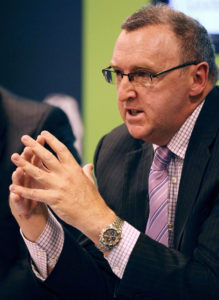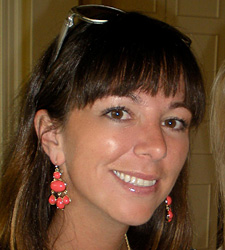
Listening & Learning. Shouldn’t we be there?
The 39th annual Global Symposium on Racing & Gaming began this week in Tucson Arizona with an international focus.
The opening panel, “Marketability of Simulcast Products for the International Audience,” addressed the challenges associated with marketing a simulcast product globally.
Many of the panelists emphasized the importance of knowing the potential new market and the wants and needs of its bettors. Details such as minimum wager amount and availability of comprehensive past performance data, as well as those as seemingly minute as whether a race is measured in furlongs or meters should not be overlooked.
Pari Mutuel Urbain Country Manager Ines Hendili has come to recognize that, “As long as the international races look like the French ones, bettors are receptive.” This means that in some cases data must be converted to be more compatible with what is customary to the wagering public in the importing country.
Pablo Kavulakian, Director of the Latin American Racing Channel, also pointed out that many US laws pertaining to commingling of wagering pools are outdated, and that the central bank regulations make the international sale of signals difficult.

Tabcorp’s Paul Cross – Integrity of the product is of utmost importance
Paul Cross, General Manager of International Business Development for Australian company Tabcorp, shared that the integrity of the racing product, whether American or of any other national origin, is of utmost importance. “Is the outcome of the event the proper outcome for the event?” Cross asks when evaluating integrity. There may be an issue when the line becomes blurred and the answer to that question is unclear.
Other panelists suggested that drug-free racing in America should be strived for, though no one expects a solution to American racing’s current issues overnight. Speakers also stressed the value of competitive fields rather than recognizable tracks when looking to import signals. Smaller tracks can absolutely have a presence in the international marketplace, with panelist Phill Adams of Phumelela Gold Enterprises stating matter-of-factly, “We’re not looking for beautiful hedges and beautiful horses. We’re looking for competitive races that will make us money.”
The international market isn’t necessarily looking for Grade I races, but rather the full fields and consistency that make an attractive wagering product.
Also on Tuesday morning was a panel examining the expansion of ADWs and online gaming in both North America and abroad.
Joseph Asher, CEO of William Hill US, whose parent company William Hill is the largest sports betting company in the world, recognizes mobile wagering and wagering kiosks as potential for growth.

William Hill USA CEO Joe Asher – behind mobile wagering
Mobile wagering is quickly overtaking the more conventional forms of online gaming, while in Nevada, the only US state that currently allows sports betting, new wagering kiosks located in bars and taverns are producing double digit increases in turnover. “The methods of content delivery are evolving,” Asher said, which leads to companies being required to innovate.
After a question was posed regarding what advice they might give to one looking to start an ADW, speaker Ed Comins emphasized how difficult the legal arena can be to navigate. “You need to empower experts, people who know what they’re doing, to help you,” explained Comins, the Chief Operating Officer at WatchandWager.com LLC.
There are additional concerns as well, some of which apply to any company that buys or sells a racing signal, such as a well thought out tote contract and the importance of convenience to today’s wagering customer. Comins also mentioned current situation with the California Horse Racing Board and its decision on exchange wagering. Comins made it clear that he feels the expansion in wagering options would be beneficial to California racing and especially to Cal Expo, the harness track that WatchandWager.com LLC owns and operates.
Tuesday’s afternoon panel sessions opened with the “Mark Kaufman Workshop – Adapting to the New Racing Media,” wherein three panellists represented their differing views on the recent explosion of social media, its gradual usurpation of traditional turf writing, and the effect it has had on racing media as a whole.

America’s Best Racing – well represented
Tom Pedulla, a journalist with America’s Best Racing, opened the panel discussion by fondly recounting a time when turf writers reigned supreme in racing news media, a bygone era when social media was not a factor.
He acknowledged his own difficulties as a writer transitioning from traditional journalism to a social mediabased reporting platform, emphasizing his concerns over the accuracy of the information being provided to the public through today’s web-based media outlets. While he acknowledged that we need “blogs and tweeting” in this rapidly evolving media atmosphere, he maintains that there will always be a need for solid editorial content.
Ray Paulick, once a traditional turf writer and currently the publisher of The Paulick Report, a web-based racing publication, touted the positive differences of being part of a smaller independent web-based media outlet from the perspective of a journalist, versus the traditional corporate media establishment.
Among the benefits he cited were a greater degree of freedom with regard to content and a more relaxed atmosphere.
In general, Paulick had a positive view of the rapidly increasing use of social media, noting that is has allowed him the opportunity to cover all relevant areas of the sport, including investigative reports as well as lighter human-interest stories.

America’s Best Racing Penelope Miller – lifting the lid on social media
Penelope Miller, Senior Manager of Digital Media at America’s Best Racing, gave a thorough tutorial covering the numerous social media outlets currently available for promotion within the racing industry.
Miller advocated for the pervasive and responsible use of social media sites such as FaceBook, YouTube, Twitter, Instagram and Pinterest to introduce the public to the exciting elements of racing such as the fashion, the social atmosphere, and the athletes themselves. She suggested, in particular, that those involved with the industry “become the authority” or the one who shapes a particular trend on the internet so as to remain ahead of the curve on current events.
Ms. Miller specifically cited a three-prong approach to using Twitter where one would build up the hype on a certain topic, provide instant updates while it is occurring, and subsequently follow up with comprehensive visual recapping afterward.
Continuing the theme of web-based social interaction for racing fans, “The Games People Play” was the apropos title of the second panel discussion of the afternoon, which consisted of a five-person presentation promoting an assortment of racing-specific social gaming opportunities.
The presenters, though representing different organizations, all delivered a similar message with regard to what they believed the market and industry benefits are for these games. In general, the games were designed to be simple and social, to cultivate new fans, expand the market, educate, and produce return customers for the sport.
Also emphasized by the panellists was the immense opportunity for profit provided by this rapidly growing market as well as the incomparable advantage these games provide through promotion of the sport.
Michael Calderone of the Stronach Group noted a “direct correlation” between participation in social games and “people being more involved with the sport.”
Robert Earle of 123Gaming succinctly stated that these games “keep eyeballs on your racing,” which is ultimately the goal of anyone with a vested interest in the sport.








